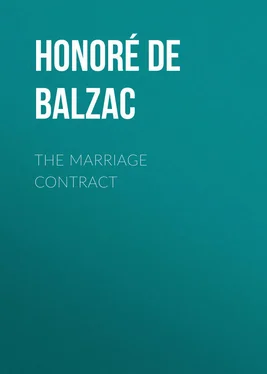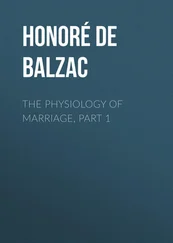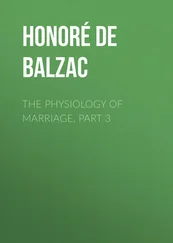Honoré Balzac - The Marriage Contract
Здесь есть возможность читать онлайн «Honoré Balzac - The Marriage Contract» — ознакомительный отрывок электронной книги совершенно бесплатно, а после прочтения отрывка купить полную версию. В некоторых случаях можно слушать аудио, скачать через торрент в формате fb2 и присутствует краткое содержание. Жанр: literature_19, foreign_antique, foreign_prose, на английском языке. Описание произведения, (предисловие) а так же отзывы посетителей доступны на портале библиотеки ЛибКат.
- Название:The Marriage Contract
- Автор:
- Жанр:
- Год:неизвестен
- ISBN:нет данных
- Рейтинг книги:5 / 5. Голосов: 1
-
Избранное:Добавить в избранное
- Отзывы:
-
Ваша оценка:
- 100
- 1
- 2
- 3
- 4
- 5
The Marriage Contract: краткое содержание, описание и аннотация
Предлагаем к чтению аннотацию, описание, краткое содержание или предисловие (зависит от того, что написал сам автор книги «The Marriage Contract»). Если вы не нашли необходимую информацию о книге — напишите в комментариях, мы постараемся отыскать её.
The Marriage Contract — читать онлайн ознакомительный отрывок
Ниже представлен текст книги, разбитый по страницам. Система сохранения места последней прочитанной страницы, позволяет с удобством читать онлайн бесплатно книгу «The Marriage Contract», без необходимости каждый раз заново искать на чём Вы остановились. Поставьте закладку, и сможете в любой момент перейти на страницу, на которой закончили чтение.
Интервал:
Закладка:
Natalie’s waist was round, – a sign of strength, but also the infallible indication of a will which becomes obstinacy in persons whose mind is neither keen nor broad. Her hands, like those of a Greek statue, confirmed the predictions of face and figure by revealing an inclination for illogical domination, of willing for will’s sake only. Her eyebrows met, – a sign, according to some observers, which indicates jealousy. The jealousy of superior minds becomes emulation and leads to great things; that of small minds turns to hatred. The “hate and wait” of her mother was in her nature, without disguise. Her eyes were black apparently, though really brown with orange streaks, contrasting with her hair, of the ruddy tint so prized by the Romans, called auburn in England, a color which often appears in the offspring of persons of jet black hair, like that of Monsieur and Madame Evangelista. The whiteness and delicacy of Natalie’s complexion gave to the contrast of color in her eyes and hair an inexpressible charm; and yet it was a charm that was purely external; for whenever the lines of a face are lacking in a certain soft roundness, whatever may be the finish and grace of the details, the beauty therein expressed is not of the soul. These roses of deceptive youth will drop their leaves, and you will be surprised in a few years to see hardness and dryness where you once admired what seemed to be the beauty of noble qualities.
Though the outlines of Natalie’s face had something august about them, her chin was slightly “empate,” – a painter’s expression which will serve to show the existence of sentiments the violence of which would only become manifest in after life. Her mouth, a trifle drawn in, expressed a haughty pride in keeping with her hand, her chin, her brows, and her beautiful figure. And – as a last diagnostic to guide the judgment of a connoisseur – Natalie’s pure voice, a most seductive voice, had certain metallic tones. Softly as that brassy ring was managed, and in spite of the grace with which its sounds ran through the compass of the voice, that organ revealed the character of the Duke of Alba, from whom the Casa-Reales were collaterally descended. These indications were those of violent passions without tenderness, sudden devotions, irreconcilable dislikes, a mind without intelligence, and the desire to rule natural to persons who feel themselves inferior to their pretensions.
These defects, born of temperament and constitution, were buried in Natalie like ore in a mine, and would only appear under the shocks and harsh treatment to which all characters are subjected in this world. Meantime the grace and freshness of her youth, the distinction of her manners, her sacred ignorance, and the sweetness of a young girl, gave a delicate glamour to her features which could not fail to mislead an unthinking or superficial mind. Her mother had early taught her the trick of agreeable talk which appears to imply superiority, replying to arguments by clever jests, and attracting by the graceful volubility beneath which a woman hides the subsoil of her mind, as Nature disguises her barren strata beneath a wealth of ephemeral vegetation. Natalie had the charm of children who have never known what it is to suffer. She charmed by her frankness, and had none of that solemn air which mothers impose on their daughters by laying down a programme of behavior and language until the time comes when they marry and are emancipated. She was gay and natural, like any young girl who knows nothing of marriage, expects only pleasure from it, replies to all objections with a jest, foresees no troubles, and thinks she is acquiring the right to have her own way.
How could Paul, who loved as men love when desire increases love, perceive in a girl of this nature whose beauty dazzled him, the woman, such as she would probably be at thirty, when observers themselves have been misled by these appearances? Besides, if happiness might prove difficult to find in a marriage with such a girl, it was not impossible. Through these embryo defects shone several fine qualities. There is no good quality which, if properly developed by the hand of an able master, will not stifle defects, especially in a young girl who loves him. But to render ductile so intractable a woman, the iron wrist, about which de Marsay had preached to Paul, was needful. The Parisian dandy was right. Fear, inspired by love is an infallible instrument by which to manage the minds of women. Whoso loves, fears; whoso fears is nearer to affection than to hatred.
Had Paul the coolness, firmness, and judgment required for this struggle, which an able husband ought not to let the wife suspect? Did Natalie love Paul? Like most young girls, Natalie mistook for love the first emotions of instinct and the pleasure she felt in Paul’s external appearance; but she knew nothing of the things of marriage nor the demands of a home. To her, the Comte de Manerville, a rising diplomatist, to whom the courts of Europe were known, and one of the most elegant young men in Paris, could not seem, what perhaps he was, an ordinary man, without moral force, timid, though brave in some ways, energetic perhaps in adversity, but helpless against the vexations and annoyances that hinder happiness. Would she, in after years, have sufficient tact and insight to distinguish Paul’s noble qualities in the midst of his minor defects? Would she not magnify the latter and forget the former, after the manner of young wives who know nothing of life? There comes a time when wives will pardon defects in the husband who spares her annoyances, considering annoyances in the same category as misfortunes. What conciliating power, what wise experience would uphold and enlighten the home of this young pair? Paul and his wife would doubtless think they loved when they had really not advanced beyond the endearments and compliments of the honeymoon. Would Paul in that early period yield to the tyranny of his wife, instead of establishing his empire? Could Paul say, “No?” All was peril to a man so weak where even a strong man ran some risks.
The subject of this Study is not the transition of a bachelor into a married man, – a picture which, if broadly composed, would not lack the attraction which the inner struggles of our nature and feelings give to the commonest situations in life. The events and the ideas which led to the marriage of Paul with Natalie Evangelista are an introduction to our real subject, which is to sketch the great comedy that precedes, in France, all conjugal pairing. This Scene, until now singularly neglected by our dramatic authors, although it offers novel resources to their wit, controlled Paul’s future life and was now awaited by Madame Evangelista with feelings of terror. We mean the discussion which takes place on the subject of the marriage contract in all families, whether noble or bourgeois, for human passions are as keenly excited by small interests as by large ones. These comedies, played before a notary, all resemble, more or less, the one we shall now relate, the interest of which will be far less in the pages of this book than in the memories of married persons.
CHAPTER III. THE MARRIAGE CONTRACT – FIRST DAY
At the beginning of the winter of 1822, Paul de Manerville made a formal request, through his great-aunt, the Baronne de Maulincour, for the hand of Mademoiselle Natalie Evangelista. Though the baroness never stayed more than two months in Medoc, she remained on this occasion till the last of October, in order to assist her nephew through the affair and play the part of a mother to him. After conveying the first suggestions to Madame Evangelista the experienced old woman returned to inform Paul of the results of the overture.
“My child,” she said, “the affair is won. In talking of property, I found that Madame Evangelista gives nothing of her own to her daughter. Mademoiselle Natalie’s dowry is her patrimony. Marry her, my dear boy. Men who have a name and an estate to transmit, a family to continue, must, sooner or later, end in marriage. I wish I could see my dear Auguste taking that course. You can now carry on the marriage without me; I have nothing to give you but my blessing, and women as old as I are out of place at a wedding. I leave for Paris to-morrow. When you present your wife in society I shall be able to see her and assist her far more to the purpose than now. If you had had no house in Paris I would gladly have arranged the second floor of mine for you.”
Читать дальшеИнтервал:
Закладка:
Похожие книги на «The Marriage Contract»
Представляем Вашему вниманию похожие книги на «The Marriage Contract» списком для выбора. Мы отобрали схожую по названию и смыслу литературу в надежде предоставить читателям больше вариантов отыскать новые, интересные, ещё непрочитанные произведения.
Обсуждение, отзывы о книге «The Marriage Contract» и просто собственные мнения читателей. Оставьте ваши комментарии, напишите, что Вы думаете о произведении, его смысле или главных героях. Укажите что конкретно понравилось, а что нет, и почему Вы так считаете.












